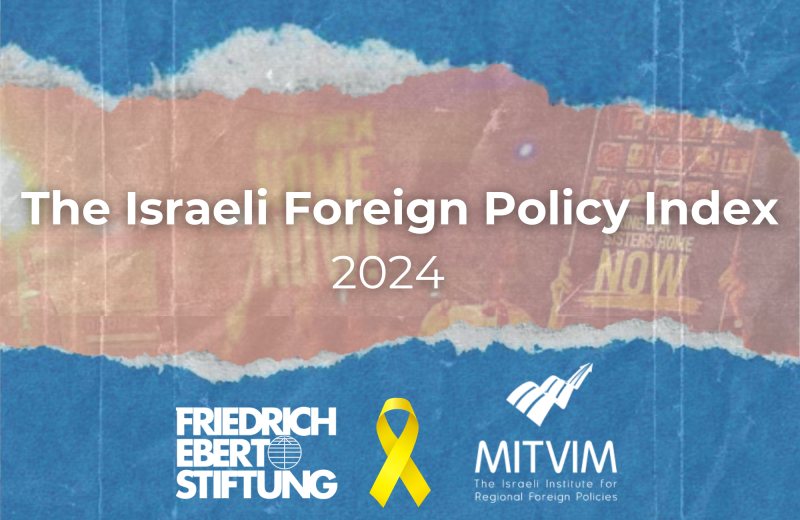
The Mitvim Institute’s twelfth annual public opinion poll on Israeli foreign policy was conducted at the end of August. The survey was conducted by the Rafi Smith Institute in collaboration with the Friedrich Ebert Foundation, among a representative sample of the adult population in Israel (862 men and women, Jews and Arabs) and with a sampling error of 3.3%.
Almost a year after the October 7th attack, the survey aimed to assess the public’s views on key issues concerning Israel’s foreign policy and strategy. It focused on immediate topics such as war objectives and potential exit strategies, while also exploring how the war has shaped the public’s strategic mindset on foreign policy issues. This document presents the findings of the survey, divided into five areas: Israel’s foreign relations, Israeli foreign policy, Israel and the Palestinians, Israel-United States relations, and Israel’s relations with regional actors.
This year the survey included, among other things, questions about the preferred outcome of the fighting in Gaza; Israel-US relations and the upcoming presidential elections; Israel’s policy towards Hezbollah in the short term, and towards Iran in the long term; Israel’s global status following the war and the danger of becoming a “pariah state”; the future of strategic relations with Egypt; Israel’s relation with the UN and international sanctions on violent settlers; The connection between the campaign against Iran and the conflict with the Palestinians; Israel’s role in the global struggle between the US, China and Russia; the humanitarian crisis in Gaza; and the future of Israel-Turkey
relations.
Main findings
A sharp drop in the Israeli public’s assessment of Israel’s situation in the world (4.31). This is a significant decrease from the relatively low score given by the public last year (5.03) and the second lowest assessment in the last decade. 70% of respondents describe Israel’s international situation as not good or not very good.
The majority of the public (57%) show great concern over the transformation of the State of Israel into a “pariah state” following the continuation of the war in Gaza and the government’s policies. This, compared to 43% who show little or no concern at all.
The public gives the government’s performance in the field of foreign relations since the beginning of the war a score of 3.84 – which is the lowest score since we started conducting the surveys in 2013. This is a drastic decrease from the relatively low score given by the public last year (4.89).
The public gives the state of the Ministry of Foreign Affairs a score of 3.94, which is also the lowest score since we started the survey a decade ago. This is a drastic decrease in the evaluation of the situation of the Ministry of Foreign Affairs from last year (5.00).
A relative majority of the Israeli public (44%) supports a package deal that includes normalization with Saudi Arabia, the establishment of a demilitarized Palestinian state that is not controlled by Hamas, and an American-led regional defense alliance. 37% oppose this deal. 19% have not yet formed an opinion on the subject.
A majority of the public (about half of the respondents) supports the international move to impose sanctions on violent settlers and settler organizations that encourage violence in the territories, as long as it is limited to violent settlers only. This, compared to the 33% who oppose the move altogether.
Building a US-sponsored regional coalition is the public’s preferred strategy for dealing with the threat from Iran and its allies. 46% support this option, compared to 32% who support launching an independent military campaign against Iran and its proxies. 14% support the opening of diplomatic negotiations with Iran. Only 8% support the continuation of the existing situation of limited fighting against Iran, Hezbollah and the Houthis.
44% of the public supports an all-out military operation in Lebanon as a preferred strategy to deal with Hezbollah in Lebanon. 25% of the respondents think that the international community should be harnessed to promote a diplomatic move that will lead to the withdrawal of Hezbollah beyond the Litani River. A similar percentage supports the promotion of a broad international arrangement to stabilize the internal system in Lebanon and delineate the land border between the countries. Only 5% support leaving the status quo with Hezbollah.


